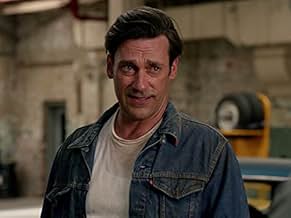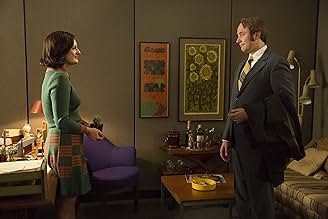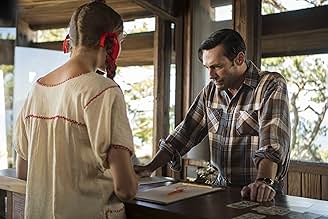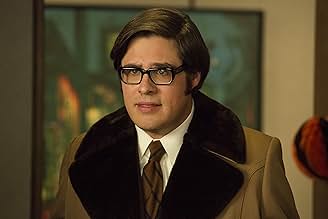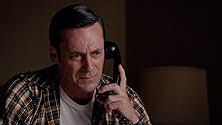El drama trata de una de las agencias de publicidad más prestigiosas de Nueva York a principios de los años sesenta, y se enfoca en el misterioso pero talentoso Donald Draper.El drama trata de una de las agencias de publicidad más prestigiosas de Nueva York a principios de los años sesenta, y se enfoca en el misterioso pero talentoso Donald Draper.El drama trata de una de las agencias de publicidad más prestigiosas de Nueva York a principios de los años sesenta, y se enfoca en el misterioso pero talentoso Donald Draper.
- Ganó 16 premios Primetime Emmy
- 166 premios ganados y 450 nominaciones en total
Explorar episodios
Resumen
Reviewers say 'Mad Men' is lauded for its deep character studies, historical accuracy, and nuanced depiction of the 1960s, focusing on the advertising industry. The show delves into themes of identity, power, and societal change, with standout performances, especially Jon Hamm as Don Draper. Its meticulous period detail receives high praise. However, some viewers critique the slow pacing, repetitive storylines, and occasional frustration with character exits and unresolved plotlines.
Opiniones destacadas
The central character in this show is a deeply damaged man called Don. He has a strong survival instinct, but he's incapable of loving or even trusting. He is running scared. He compensates for his insecurity and emptiness by pursuing primal things that soothing his ego. He has to feel that he's in control, even though he's living on the edge. He tries to be the "Alpha Male" conquering all around him. In reality, he is a juggler about to drop all the balls.
The others in this show are complex human beings whose characters dictate how their lives evolve and ultimately end up.
One interesting character that you follow throughout the series is Peggy. She enters the world of advertising as a total innocent, but as the show progresses, you'll see her become a worldly and powerful business woman.
The show is full of examples of the attitudes and mindset of the 1960s. The type writer was designed "so even a woman can learn how to use it". Everybody smokes, a lot. It's ok for kids to play with plastic bags over their heads. Women are treated in a way that would surely be considered sexual harassment in today's world. These unacceptable things jump out at you and startle you, and give you a flavor of that era.
The show was a hit for a reason. It's very good!
The others in this show are complex human beings whose characters dictate how their lives evolve and ultimately end up.
One interesting character that you follow throughout the series is Peggy. She enters the world of advertising as a total innocent, but as the show progresses, you'll see her become a worldly and powerful business woman.
The show is full of examples of the attitudes and mindset of the 1960s. The type writer was designed "so even a woman can learn how to use it". Everybody smokes, a lot. It's ok for kids to play with plastic bags over their heads. Women are treated in a way that would surely be considered sexual harassment in today's world. These unacceptable things jump out at you and startle you, and give you a flavor of that era.
The show was a hit for a reason. It's very good!
Mad Men was such a terrific show that is absolutely just as good as everyone says it is. I never watched it when it was originally on but after hearing so many great things about it I finally gave it a chance and streamed it. I was blown away but how much I loved it. There's a reason it won so many awards when it was on...because it's terrific! The acting, writing, directing, production, attention to detail, etc are all among the best in television history! I can see why some people may not like it because it does starts off a little slow but give it a few episodes because it absolutely pays off and then you won't want to stop watching it until you binge the entire series!
The brilliance is all in the subtext. There are many hilarious moments that are only funny if you've been paying attention and understand where the character is coming from. There are also many tragic moments that would pass you by if you didn't know what came before. Many lines have double or even triple meanings. Watch this from the beginning, with a friend. Believe me, you will want to discuss each episode afterward to figure out some of the nuances of what happened.
The main Mad Man is the confident womanizer Don Draper, who is head of the Creative department at a mid-sized ad agency in 1960s Madison Avenue. I admit, at first I kind of hated him, but as the viewer learns more about him and his past, I learned to - not love him exactly - but like him and want to watch him endlessly. He is a complicated character who can be a very good man, but also a very bad man.
Don Draper is joined by a rich cast of supporting characters, many of whom deserve a show of their own: The ambitious young Campbell who is utterly sleazy most of the time, but has occasional moments of growth and even cuteness.Peggy Olson starts out as Draper's secretary, but her growth into a strong, confident woman mirrors what is happening for Woman in the 60's. Silver fox Stirling - he may be morally bankrupt but gets some of the best lines. I could go on . . .
The 60's clothes, hairstyles, decor, and current events provide an interesting backdrop for what is essentially a character piece. The setting provides both the occasional laugh (cigarettes being advertised as "healthy") and the more than occasional cringe (how could dumping trash from a picnic in the park right on the grass ever seem okay?!).
If you need fast-paced action or a laugh track, this definitely isn't the show for you. But, if you like character development and subtlety in your television shows, rent the first seasons on DVD and settle in. You won't regret it.
The main Mad Man is the confident womanizer Don Draper, who is head of the Creative department at a mid-sized ad agency in 1960s Madison Avenue. I admit, at first I kind of hated him, but as the viewer learns more about him and his past, I learned to - not love him exactly - but like him and want to watch him endlessly. He is a complicated character who can be a very good man, but also a very bad man.
Don Draper is joined by a rich cast of supporting characters, many of whom deserve a show of their own: The ambitious young Campbell who is utterly sleazy most of the time, but has occasional moments of growth and even cuteness.Peggy Olson starts out as Draper's secretary, but her growth into a strong, confident woman mirrors what is happening for Woman in the 60's. Silver fox Stirling - he may be morally bankrupt but gets some of the best lines. I could go on . . .
The 60's clothes, hairstyles, decor, and current events provide an interesting backdrop for what is essentially a character piece. The setting provides both the occasional laugh (cigarettes being advertised as "healthy") and the more than occasional cringe (how could dumping trash from a picnic in the park right on the grass ever seem okay?!).
If you need fast-paced action or a laugh track, this definitely isn't the show for you. But, if you like character development and subtlety in your television shows, rent the first seasons on DVD and settle in. You won't regret it.
10alexnapo
When I started watching Mad Men, the rhythm of it felt slow.
Pretty quickly did I realize how much more powerful the slow story & plot development rhythm would be, allowing us to discover the characters, mostly in seasons 1 and 2, and then really be in the thick of it in subsequent seasons.
Indeed, this series has pushed character development so far that they are the entire and only reason why this series is interesting. The actual events happening at the advertising agency is a pretext to throw more things at those characters and have them deal with it. In fact, the characters are so interesting that there is practically no violence needed (except a few minor events) over 7 seasons to keep this series going. I find that tremendously respectable to be able to craft a series in this way, not using gun shots and bombs to make it lively.
Finally, I have not lived in the early 60's time period the series is set in, but I can only say that it's all seemed to me very interesting and all these "vintinge" props and costumes, hair style and such made it all the more fascinating to watch.
Absolutely great work.
Pretty quickly did I realize how much more powerful the slow story & plot development rhythm would be, allowing us to discover the characters, mostly in seasons 1 and 2, and then really be in the thick of it in subsequent seasons.
Indeed, this series has pushed character development so far that they are the entire and only reason why this series is interesting. The actual events happening at the advertising agency is a pretext to throw more things at those characters and have them deal with it. In fact, the characters are so interesting that there is practically no violence needed (except a few minor events) over 7 seasons to keep this series going. I find that tremendously respectable to be able to craft a series in this way, not using gun shots and bombs to make it lively.
Finally, I have not lived in the early 60's time period the series is set in, but I can only say that it's all seemed to me very interesting and all these "vintinge" props and costumes, hair style and such made it all the more fascinating to watch.
Absolutely great work.
Everyone has a back burner watchlist of TV shows considered to be the greatest. These are often graced by the likes of Breaking Bad, Deadwood, The Wire, The Sopranos, and, of course, Mad Men. Even though these shows may be indeed great, you may be familiar with a weird avoidance mechanism that usually kicks in: we may regard those landmark pieces of TV not very exciting, especially if they are a few years old - not unlike "must-read" literary classics that nobody ever reads - and thus we relegate them to the bottom of our watchlists, while we consume the latest, more exciting, and often less fulfilling offers.
Then, when you finally make the effort to watch that landmark series and realize it is every bit as good as everyone said it was, you flagellate yourself thinking why you held back for so long.
This Great-TV-Show-Avoidance-Mechanism happened to me in regards to Mad Men. A show about advertising and corporate people did not seem very exciting to me, and I wasn't really a fan of anyone in the cast (save Elizabeth Olson). Having in the past started to watch best-of-all-time TV shows just to drop them along the way - I'm looking at you, The Sopranos - I kept it on the back burner for a very long time. Now, after consuming all of Mad Men in a relatively short amount of time, I think it is the most consistently good TV show I have ever watched.
Out of the 92 episodes in the entire series on IMDb, I have rated only two a 7. All the rest got a rating of either 8 or 9 (I don't believe in perfection, so 9 is as high as I go). The key word here, alongside consistency, is even-handedness. Even though there are standout episodes, usually popping out unpredictably within seasons, rather than near the end like most other shows, Mad Men's episodes are so well balanced in terms of drama, character development and plot advancement that you feel you are witnessing interesting lives go by - extremely well costumed, photographed, written and acted lives, but fictional nonetheless. Compared to most other shows, there is a refreshing under-reliance on plot twists and melodramatic acting scenes, which now seem to me like the bluntest tools in the writer's bag of tricks to keep viewers tuning in every week. Perhaps Mad Men's greatest achievement is just that: through the power of character and acting alone, it manages to capture the viewers' interest while dispensing with more traditional tricks of storytelling. Of course, other facets of the production, such as the attention to period detail, costume design and cinematography are really good too. But what stands out and keeps us watching is the near-perfect marriage between solid writing, first, and solid acting, second - acting here defined in terms of how perfectly the actors inhabit their roles, not the showy, larger-than-life, award-stealing acting scenes you find in Oscar bait films. And I tell you from experience, the binge pull of the series makes it nearly impossible to watch a single episode in a sitting. I have only been able to pull that off once, with the final episode.
The way the plot is handled is simply masterful. For instance, if a character goes on a quest to achieve something, and we spend some time witnessing the build-up to it, it is not guaranteed they will (ever) succeed, or that at least a lesson will be learned at the end of the day. Things may end up just like they are - a lot like real life. The backdrop of US history unfolding is neither overpowering, i.e., stealing attention from the characters or events at hand, or just a side note mentioned without consequence. These historically-inspired scenes excel in revealing interesting takes on people's attitudes (secretaries crying over Marilyn Monroe's death, for instance) while providing startling contrasts to our times. Another striking feature of the show I'd like to mention is that, now and again, there are a few scenes with unimportant characters - like a child doing something they ought not to do, feeling guilty, and trying to hide it afterwards - that seem to be there mostly to make us feel, "yes, I have felt this before, this is familiar to me". Those "snippets of reality," as I call them, serve no narrative purpose whatsoever and don't even advance our understanding of the characters, but they do a great deal to establish the mood and reinforce our connection to the characters, even if indirectly. By including these moments in small amounts and in the right moment, the writers are still able to keep everything on track while disregarding the common writing advice that every scene should either advance the plot or deepen character development (or better yet, both at the same time). By the way, I have rarely seen such "extraneous" scenes elsewhere, and when they do appear, they are due mostly to an editor or writer's incompetence rather than to the command of their craft.
On top of all that, the show is also a wonderfully honest piece of television. It does not promise or deliver anything more than what you see on screen. After a couple of seasons, you are likely to be able to predict to a high degree of accuracy how it is all going to end - Mad Men operates within such a well thought out "narrative system", with clearly defined bounds, that you know exactly what NOT to expect. The way the series finale begins and ends makes you feel like you are watching just another episode and, miraculously, still manages to satisfy.
In closing, I should note that Mad Men does not provide the blockbuster-y thrills of, say, Game Thrones before it became a catastrophic failure, Westworld in its first season, or Breaking Bad during the Gus Fring phase. Above all, it shows that it is entirely possible to make great, often magnificent, television without any sort of sensationalized acting, clichéd dialogue or narrative acrobatics. I have already completely forgotten Game of Thrones and don't plan on rewatching any time soon. I find it unlikely I will ever do the same to Mad Men.
Then, when you finally make the effort to watch that landmark series and realize it is every bit as good as everyone said it was, you flagellate yourself thinking why you held back for so long.
This Great-TV-Show-Avoidance-Mechanism happened to me in regards to Mad Men. A show about advertising and corporate people did not seem very exciting to me, and I wasn't really a fan of anyone in the cast (save Elizabeth Olson). Having in the past started to watch best-of-all-time TV shows just to drop them along the way - I'm looking at you, The Sopranos - I kept it on the back burner for a very long time. Now, after consuming all of Mad Men in a relatively short amount of time, I think it is the most consistently good TV show I have ever watched.
Out of the 92 episodes in the entire series on IMDb, I have rated only two a 7. All the rest got a rating of either 8 or 9 (I don't believe in perfection, so 9 is as high as I go). The key word here, alongside consistency, is even-handedness. Even though there are standout episodes, usually popping out unpredictably within seasons, rather than near the end like most other shows, Mad Men's episodes are so well balanced in terms of drama, character development and plot advancement that you feel you are witnessing interesting lives go by - extremely well costumed, photographed, written and acted lives, but fictional nonetheless. Compared to most other shows, there is a refreshing under-reliance on plot twists and melodramatic acting scenes, which now seem to me like the bluntest tools in the writer's bag of tricks to keep viewers tuning in every week. Perhaps Mad Men's greatest achievement is just that: through the power of character and acting alone, it manages to capture the viewers' interest while dispensing with more traditional tricks of storytelling. Of course, other facets of the production, such as the attention to period detail, costume design and cinematography are really good too. But what stands out and keeps us watching is the near-perfect marriage between solid writing, first, and solid acting, second - acting here defined in terms of how perfectly the actors inhabit their roles, not the showy, larger-than-life, award-stealing acting scenes you find in Oscar bait films. And I tell you from experience, the binge pull of the series makes it nearly impossible to watch a single episode in a sitting. I have only been able to pull that off once, with the final episode.
The way the plot is handled is simply masterful. For instance, if a character goes on a quest to achieve something, and we spend some time witnessing the build-up to it, it is not guaranteed they will (ever) succeed, or that at least a lesson will be learned at the end of the day. Things may end up just like they are - a lot like real life. The backdrop of US history unfolding is neither overpowering, i.e., stealing attention from the characters or events at hand, or just a side note mentioned without consequence. These historically-inspired scenes excel in revealing interesting takes on people's attitudes (secretaries crying over Marilyn Monroe's death, for instance) while providing startling contrasts to our times. Another striking feature of the show I'd like to mention is that, now and again, there are a few scenes with unimportant characters - like a child doing something they ought not to do, feeling guilty, and trying to hide it afterwards - that seem to be there mostly to make us feel, "yes, I have felt this before, this is familiar to me". Those "snippets of reality," as I call them, serve no narrative purpose whatsoever and don't even advance our understanding of the characters, but they do a great deal to establish the mood and reinforce our connection to the characters, even if indirectly. By including these moments in small amounts and in the right moment, the writers are still able to keep everything on track while disregarding the common writing advice that every scene should either advance the plot or deepen character development (or better yet, both at the same time). By the way, I have rarely seen such "extraneous" scenes elsewhere, and when they do appear, they are due mostly to an editor or writer's incompetence rather than to the command of their craft.
On top of all that, the show is also a wonderfully honest piece of television. It does not promise or deliver anything more than what you see on screen. After a couple of seasons, you are likely to be able to predict to a high degree of accuracy how it is all going to end - Mad Men operates within such a well thought out "narrative system", with clearly defined bounds, that you know exactly what NOT to expect. The way the series finale begins and ends makes you feel like you are watching just another episode and, miraculously, still manages to satisfy.
In closing, I should note that Mad Men does not provide the blockbuster-y thrills of, say, Game Thrones before it became a catastrophic failure, Westworld in its first season, or Breaking Bad during the Gus Fring phase. Above all, it shows that it is entirely possible to make great, often magnificent, television without any sort of sensationalized acting, clichéd dialogue or narrative acrobatics. I have already completely forgotten Game of Thrones and don't plan on rewatching any time soon. I find it unlikely I will ever do the same to Mad Men.
¿Sabías que…?
- ErroresEpisodes from Season 1 to Season 3 feature rotary phones with clear plastic finger wheels. These episodes take place before 1964, when the plastic wheel was introduced. Before that, the finger wheels were black and metal.
- Citas
[repeated line]
Don Draper: What do you want me to say?
- ConexionesEdited into Yoostar 2: In the Movies (2011)
Selecciones populares
Inicia sesión para calificar y agrega a la lista de videos para obtener recomendaciones personalizadas
- How many seasons does Mad Men have?Con tecnología de Alexa
- How come no one can tell that Sal is gay?
- Do they really smoke all those cigarettes?
- In what month and year is Mad Men set?
Detalles
- Fecha de lanzamiento
- País de origen
- Sitios oficiales
- Idioma
- También se conoce como
- Gã Điên
- Locaciones de filmación
- Productoras
- Ver más créditos de la compañía en IMDbPro
Contribuir a esta página
Sugiere una edición o agrega el contenido que falta








